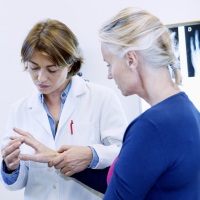Keele joins forces with Oxford and Southampton universities to tackle pain

Leading charity, Arthritis Research UK has awarded a team of Keele University researchers £300,000 to investigate how musculoskeletal pain can affect people’s health and overall quality of life - and they are looking for people across North Staffordshire to take part.
Previous research indicates that musculoskeletal conditions (pain that comes from bones, muscles and joints from conditions such as low back pain, osteoarthritis and osteoporosis) are prevalent in the UK, with one in six of the working-age population being restricted in work due to a musculoskeletal condition. This can have severely damaging effects on a person’s quality of life, with one in ten osteoarthritis sufferers being later diagnosed with neurosis.
Keele University has joined forces with both Southampton and Oxford universities to conduct the ‘North Staffordshire Health Study’ which is funded by Arthritis Research UK, as part of the charity’s investment programme in breakthrough treatments to help support everyone affected by arthritis.
The study aims to respond to the urgent need for healthcare services to provide better measures that will maximise the quality of life for people suffering with various musculoskeletal conditions, and will play a critical role in responding to the challenges that patients are currently facing.
Patients from GP practices across North Staffordshire will be asked to complete a short health survey as part of the survey, with £200 being donated to a local charity for every 1,000 questionnaires completed.
Dr Ross Wilkie, who is leading the study, commented: “The World Health Organisation and Public Health England are encouraging the use of electronic data collection to improve gaps in musculoskeletal health, and this study is the first step. 90% of patients report symptoms of musculoskeletal disorders and patients completing this survey will allow us to better understand how to prevent and manage these disorders.”
For further details about the study and to take the survey, please visit the website.

